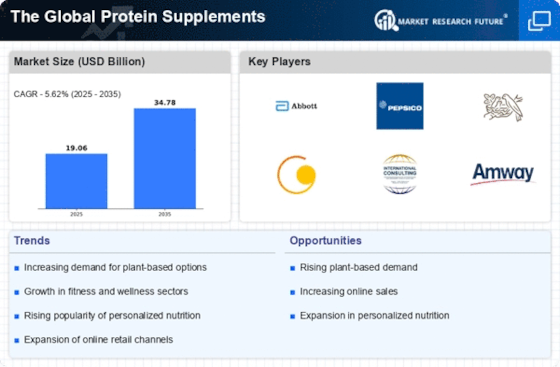Top Industry Leaders in the Protein Supplements Market

The protein supplements market is a highly competitive space driven by the increasing demand for fitness and wellness products. As of 2023, key players in this industry have been strategically positioning themselves to capitalize on this growing market, employing diverse strategies to maintain and expand their market shares.
Major contenders in the protein supplements market include
- Nature’s Bounty Co. (U.S.)
- Glanbia Plc (Ireland)
- Herbalife Nutrition Ltd. (U.S.)
- GlaxoSmithKline Plc (U.K.)
- Abbott Laboratories (U.S.)
- Amway Corp (U.S.)
- GNC Holdings, Inc. (U.S.)
- Vitaco Health Group (New Zealand)
- Living Essentials Marketing, LLC (U.S.)
- Garden of Life, LLC (U.S.)
Strategies Adopted:
These companies have established themselves as leaders, with extensive product portfolios that cater to a wide range of consumer preferences. Glanbia, known for brands like Optimum Nutrition and BSN, has a robust presence in the sports nutrition segment. Amway, Abbott, and Herbalife have successfully penetrated the market with a focus on health and wellness, while PepsiCo, through its acquisition of CytoSport, has strengthened its position in the protein supplements domain.
Strategies Adopted:
The key players in the protein supplements market have been adopting various strategies to gain a competitive edge. Product diversification remains a common approach, with companies expanding their portfolios to include not only traditional protein powders but also bars, ready-to-drink shakes, and personalized nutrition solutions. Strategic partnerships and collaborations, especially with fitness influencers and health professionals, have become instrumental in enhancing brand visibility and credibility. Furthermore, aggressive marketing campaigns, both online and offline, play a pivotal role in capturing consumer attention and loyalty.
Factors for Market Share Analysis:
Market share in the protein supplements industry is influenced by several factors. Brand reputation and recognition, product quality, pricing strategies, and distribution networks are critical determinants. Consumer trust and loyalty also play a significant role, with many customers relying on established brands known for their efficacy and safety. Companies that effectively leverage these factors, alongside innovative product development and responsiveness to market trends, are better positioned to secure and expand their market shares.
New and Emerging Companies:
While the market is largely dominated by established players, there is a notable influx of new and emerging companies seeking to capitalize on the growing demand for protein supplements. Start-ups and niche brands are carving out their spaces by offering unique formulations, plant-based alternatives, and sustainable packaging. Companies such as Orgain and Huel have gained traction with their focus on clean ingredients and meal replacement solutions, presenting alternatives to traditional protein supplement offerings.
Industry News and Current Company Investment Trends:
Recent developments in the protein supplements market highlight a trend of significant investments by key players. Glanbia, for instance, announced a substantial investment in research and development to create innovative and science-backed products. Amway has strategically invested in digital marketing and e-commerce platforms to reach a wider audience, adapting to the changing retail landscape. Abbott Laboratories expanded its production capacities to meet the increasing demand for its nutritional products, while Herbalife Nutrition intensified its efforts in community engagement and wellness programs. These investment trends underline the industry's commitment to innovation, digital transformation, and meeting the evolving needs of consumers.
Overall Competitive Scenario:
The overall competitive scenario in the protein supplements market is characterized by a mix of established industry leaders, striving to maintain their dominance, and new entrants disrupting traditional norms. The market's growth is propelled by factors such as increased health awareness, a surge in fitness activities, and a shift towards healthier lifestyles. The competition is not only about offering high-quality products but also about understanding consumer preferences, addressing specific health concerns, and staying agile in response to market dynamics.
Recent Developments:
The protein supplements market witnessed notable developments that shaped the industry landscape. Glanbia, in a bid to enhance its sustainable practices, announced a comprehensive plan to reduce its carbon footprint and use eco-friendly packaging materials. Amway, responding to the global trend of plant-based nutrition, introduced a new line of vegan protein supplements. Abbott Laboratories expanded its market reach through strategic acquisitions, tapping into emerging markets with a focus on localized product offerings. These developments reflect the industry's commitment to environmental responsibility, addressing evolving dietary preferences, and strategic expansion to capitalize on untapped market potentials.











